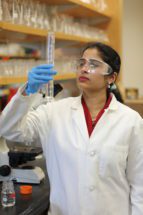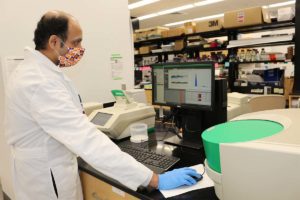Soybean is one of the top cash crops grown in South Carolina, but high temperatures during the growing season limit yields and cut into profits.
Two Clemson University researchers believe a better understanding of traits associated with heat tolerance in soybean can help in developing heat-tolerant varieties that can lead to more sustainable crop production. They have received a $649,895 grant from the United States Department of Agriculture National Institute of Food and Agriculture (USDA-NIFA) to study soybean’s efficiency for heat tolerance. This grant continues research in which the researchers are examining traits that lead to heat tolerance in soybean.

Researchers conducting this study are Sruthi Narayanan, an assistant professor and researcher in the Clemson Department of Plant and Environmental Sciences, and Sachin Rustgi, an assistant professor and researcher of molecular breeding housed at the Pee Dee Research and Education Center (REC) in Florence, South Carolina.
“The long-term goal for this project is to improve soybean’s climate resilience so that it can produce stable yields under heat stress conditions,” said Narayanan, lead investigator for the project.
The researchers seek to find soybean genes associated with lipid metabolic changes that contribute to heat tolerance. The researchers plan to identify molecular markers to use in screening soybean plants for heat tolerance. Rustgi will use equipment in the Pee Dee REC’s molecular breeding lab to conduct his research.
“Molecular markers for heat tolerance will be the key deliverable from this project,” Rustgi said. “These markers will help advance soybean breeding programs in developing heat-tolerant varieties.”

The project aims to generate information on lipid metabolic changes, physiological mechanisms and their genetic controls that confer heat tolerance in soybean. During the project researchers will evaluate contemporary high-value soybean varieties with high seed oleic acid content and drought tolerance. The data generated will provide producers with information on the heat tolerance of these varieties.
Soybeans typically are planted in South Carolina from May 10 to July 11 and harvested from Oct. 20 to Dec. 30. They require a soil temperature of about 54 degrees to germinate. Soil temperatures typically are higher than air temperatures during summer months. Climate data shows the average air temperature from May to July in South Carolina is 89 degrees. According to the Environmental Protection Agency, South Carolina temperatures have warmed by one-half to one degree in the past century.

Soybean is a major crop grown in South Carolina. According to the USDA National Agricultural Statistics Service, 310,000 acres of soybeans were harvested in the state in 2020. In addition to being an important crop for South Carolina farmers, soybean also is an important oilseed and affordable source of protein for many people worldwide.
Michael Plumblee, Clemson Cooperative Extension Service corn and soybean specialist housed at the Edisto REC in Blackville, said this project has the potential to be very beneficial for the state’s soybean industry.
“With our warm summer climate, we often see temperatures more than 85° during the growing season,” Plumblee said. “At temperatures greater than 85°, we can experience several different issues with soybean such as reduced nodulation, slowed photosynthesis, abortion of flowers and small pods, as well as production of smaller seed. All of these can be yield-limiting.
“If soybean germplasm can be developed that can tolerate temperatures greater than 85° and then used in breeding programs throughout the Southeastern United States, this ultimately could increase soybean yields across the state and region.”
This study is funded through Oct. 31, 2026.
-END-







